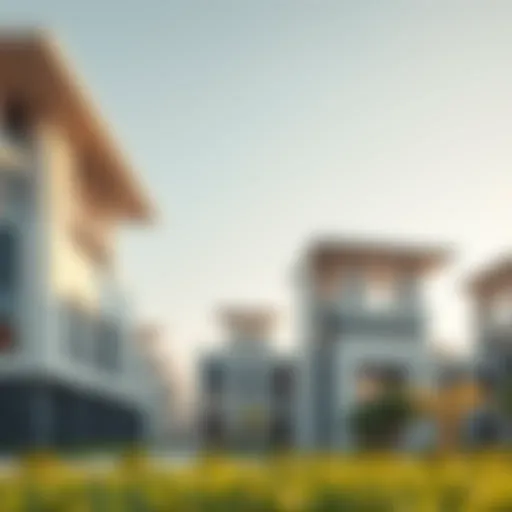The Start of Ramadan in Dubai: Timing and Significance 2023
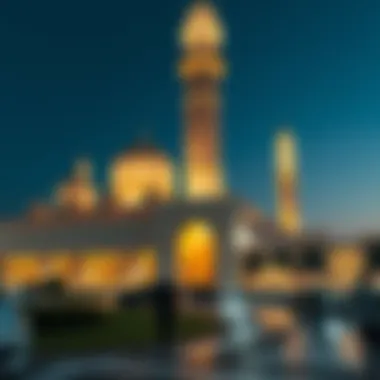

Intro
As Dubai gears up for Ramadan in 2023, understanding the spiritual significance and cultural practices associated with the month becomes essential for both residents and visitors alike. Ramadan, a time devoted to reflection, prayer, and community, marks the ninth month of the Islamic lunar calendar. The exact start date often hangs in the balance of the moon’s appearance, which can differ slightly across regions. In 2023, anticipation builds around the potential start date, which falls around March 23 or 24, pending the sighting of the moon.
This holy month brings along a unique blend of spiritual observance and vibrant community interactions. In Dubai, a city that amalgamates tradition with rapid modernization, the observance of Ramadan profoundly impacts various facets of life—from cultural practices to economic activity. For property investors, understanding these dynamics can offer strategic advantages as the narrative around real estate in Dubai evolves during this period.
The months leading up to and during Ramadan witness a flurry of activities and community programs as people prepare for the holy month; this is also when specific trends in real estate begin to surface. The emphasis often lies upon creating spaces that foster community ties while accommodating a surge of visitors and expatriates during this time. Below, we delve deeper into the insights garnered from the current market landscape and the intersection of Ramadan with property investment strategies.
Understanding Ramadan
The significance of Ramadan extends far beyond mere fasting; it embodies a time of spiritual renewal, reflection, and community bonding. In Dubai, this holy month is recognized not only through acts of devotion but also as a unique blend of cultural practices that enrich the social fabric of the emirate. For investors and expatriates alike, understanding Ramadan opens doors to respecting local traditions and forging connections within the community.
Definition and Importance
Ramadan, the ninth month of the Islamic calendar, marks the period when the Quran was first revealed to Muhammad. This is a sacred time for Muslims worldwide and is characterized by fasting from dawn until dusk, during which they abstain from food, drink, and other physical needs. The importance of this month lies in its emphasis on spiritual growth, empathy towards the less fortunate, and a committed practice of faith.
Fasting during Ramadan is not just about abstaining from food; it signifies purification of the soul. Many Muslims partake in additional prayers and recitation of the Quran, seeking to grow closer to God. The nightly gathering for Iftar (the meal to break fast) fosters community, which is especially vital in a melting pot like Dubai, where individuals from diverse backgrounds congregate.
Historical Context
To appreciate Ramadan’s place in modern society, one must look back at its historical roots. This period was established in 624 CE when Muhammad received divine commands regarding its observance. The rituals surrounding Ramadan have not only been preserved but have also evolved to reflect the vibrant culture of different regions.
In Dubai, the appreciation for Ramadan goes hand-in-hand with the emirate's rapid development. Historically a trade hub, Dubai’s diverse population has shaped the way Ramadan is observed today. This is a month marked by charity; many businesses and leaders participate in philanthropic efforts, showcasing a collective spirit of giving.
"In the spirit of Ramadan, generosity knows no boundaries."
Thus, understanding the historical underpinnings of Ramadan amplifies its relevance today, shedding light on the real estate market's fluctuations during this period and the cultural lens through which investors should view opportunities.
The Islamic Lunar Calendar
Understanding the Islamic Lunar Calendar is fundamental to grasping the importance of Ramadan in 2023. Timekeeping in the Islamic tradition adheres to lunar cycles, providing a different rhythm to life compared to the solar calendar most people are familiar with. This calendar consists of twelve months that alternate between 29 and 30 days, tallying to around 354 days in a year. Each month takes its cue from the phases of the moon, especially crucial when determining the start of Ramadan, a month of fasting and spiritual reflection.
Mechanics of the Lunar Cycle
The lunar cycle plays a significant role in many cultures, particularly in Islam, where it dictates essential observances and rituals. The cycle begins with the new moon, signaling the start of a new month. As the moon waxes, light gradually increases, reaching its zenith at the full moon before waning back into darkness. This cycle forms the backbone of the Islamic year, which is shorter than the Gregorian year, causing Islamic months to drift through the seasons over time.
For instance, Ramadan may fall in cold, summer, or even monsoon seasons depending on the year. This fluidity presents unique challenges and experiences for Muslims across different regions. In 2023, the shifts in schedule will offer various climates and times of fasting that have their own significance. For investors in Dubai, understanding this cycle affects when community engagements flourish, ideal for planning events or real estate transactions.
Moon Sighting Practices
Moon sighting is not only a ceremonial practice but also a deeply entrenched custom that reflects the spiritual fabric of Islamic life. Traditionally, the beginning of Ramadan is confirmed through the physical sighting of the moon, a practice that continues to hold strong significance. Different countries may announce the start based on local sightings, leading to diversity in practices globally.
In Dubai, the crescent moon's visibility often depends on weather conditions and geographical factors. Communities gather to witness it, intertwining social interaction with their faith. This method of determining the start of Ramadan can foster a sense of unity among Muslims as they share this special moment together.
"The sighting of the moon is not just a ritual; it's a communal experience that brings families and friends together, deepening spiritual ties."
Consequently, both investors and residents must stay attuned to announcements from local mosques and authorities regarding moon sightings. This knowledge helps in planning daily activities, defining work hours, or setting up community initiatives during Ramadan, enabling a culturally and economically vibrant atmosphere.
Understanding the Islamic Lunar Calendar and its moon sighting practices equips stakeholders with insights beyond mere dates. It allows for a nuanced appreciation of local customs, enhancing the cultural tapestry that defines mission-critical engagements during Ramadan in Dubai.
Ramadan 2023: Key Dates
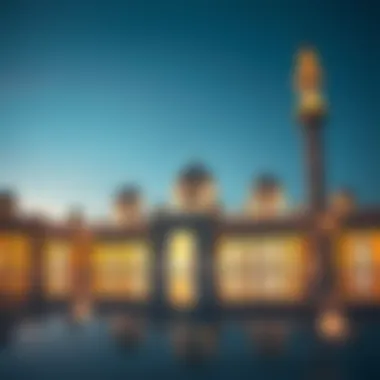

Understanding the key dates for Ramadan in 2023 is paramount for anyone living in or engaging with Dubai during this spiritually rich time. Significant not just for observance but also for cultural and communal activities, these dates set the rhythm of daily life in the emirate. Knowing when Ramadan starts and ends provides insight into the practices and traditions that shape this holy month. Investors, realtors, and expatriates can benefit greatly from grasping these dates, as they impact social dynamics and business activity.
Projected Start Date
For 2023, the first day of Ramadan is projected to begin on the evening of March 22 and extend into March 23, depending on the sighting of the moon. This initial day marks a significant pivot—an invitation to spiritual reflection and community bonding. As evening falls and the crescent moon appears, families gather for prayers and discussions around their hopes for the month ahead. Knowing this date also helps expatriates plan their schedules, given that traditional work hours adjust during fasting hours.
Typically, Dubai experiences a shift as restaurants and businesses modify their operating hours, accommodating a culture that thrives on its breaks for meals during daylight hours. Real estate interests may also find this transition noteworthy; understanding when most people will be offline can inform property showings, community events, and potential investment opportunities.
Predicted Duration
Ramadan traditionally lasts 29 to 30 days but varies based on moon sightings. In 2023, if the lunar cycle holds true, Ramadan is expected to wrap up on April 20 or April 21. So, whether you're contemplating business engagements or planning community gatherings, this range of expected dates is essential for narrowing down effective strategies.
During this month, daily life pivots significantly, bringing to light the spirit of community. A notable aspect often overlooked is the investor's eye for new developments that can bolster the sense of community. For instance, projects with outdoor spaces or dining avenues that accommodate Iftar—when the fast is broken—can gain traction.
As the month progresses, the significance of Eid al-Fitr becomes clear, marking the festive end of Ramadan. The anticipation felt by families and friends as they prepare for this celebration can shift market trends, as there's heightened interest in properties within close proximity to community spaces and facilities catering to such gatherings.
**"Ramadan is not just about fasting; it’s a time to reconnect with our roots, our families, and the community. Understanding its rhythm can guide us to better connect with the people we serve."
Recognizing these key dates of Ramadan in 2023 not only enriches one's experience in Dubai but also plays a crucial role in making informed decisions for both social and economic engagements. This time of year showcases opportunities for cultural enrichment that extend beyond merely the spiritual.
Cultural Practices During Ramadan in Dubai
The cultural practices during Ramadan in Dubai present a vibrant tapestry woven with spirituality, community, and tradition. As one of the most significant periods in the Islamic calendar, Ramadan is not just about fasting but also about fostering deep connections among the community, showcasing unity and compassion. These practices are integral for understanding the societal fabric of Dubai, where diverse cultures intersect.
Daily Rituals and Prayers
In Dubai, the early mornings during Ramadan resonate with the call to Fajr prayer, heralding the start of the day before dawn. Observant Muslims participate in this essential ritual to focus on prayer and reflection. Following this, many engage in Suhoor, the pre-dawn meal. It is common for families and friends to gather, sharing not just food but also stories and experiences to strengthen their bonds and set intentions for the day ahead.
Once the day unfolds, worshippers often find time for the Dhuhr, Asr, and Maghrib prayers, each punctuating the day with moments of introspection and spiritual growth. It’s interesting to note that the communal aspect of Tarawih, the special night prayers following Isha, gathers people from various backgrounds, reinforcing the essence of community.
Iftar and Suhoor Traditions
As the sun sets, the anticipation of Iftar, the evening meal to break the fast, becomes palpable. The tradition here is to break the fast with dates and water, adhering to the practices of the Prophet Muhammad. This simple act is symbolic, acting as a reminder of humility and gratitude.
In Dubai, restaurants and cafes come alive with special Iftar buffets, showcasing an assortment of traditional dishes like Shorbat Adas (lentil soup) and Samboosa (samosas), offering a buffet of flavors that draw influence from various cultures. Families often invite their neighbors—regardless of religious backgrounds—reflecting a communal spirit that embraces diversity.
Suhoor is another experience worth mentioning, providing a moment to fuel up for the day ahead. Sharing this meal with others mirrors the tenets of togetherness and hospitality so prevalent in Emirati culture. Whether dining at home or in bustling restaurants, the essence of connection is never lost.
Community Events and Activities
Community involvement is at the heart of Ramadan in Dubai. The mosque yards often host iftar tents, providing food for those in need or for anyone wishing to break their fast with the community. These events act as melting pots where people from different walks of life gather to share their experiences and stories.
During this month, you might also find community initiatives like educational workshops about the significance of Ramadan, or events aimed at promoting dialogue between locals and expatriates. Festivals brim with cultural displays, exhibitions of art, and musical performances that resonate with the spiritual essence of Ramadan.
Moreover, charitable activities surge during this time. Many residents contribute to food drives and donation camps, emphasizing the spirit of giving that Ramadan promotes. It’s a time when Dubai shines with benevolence, underscoring values that resonate with people globally.
Ramadan in Dubai is not just a period of fasting but is about spiritual awakening and community bonding. Understanding these cultural practices provides valuable insight, particularly for expatriates and investors, into the vibrant social landscape of the city.
Ramadan and Dubai's Lifestyle
Ramadan in Dubai is more than just a holy month; it brings a wave of transformations that touch every aspect of daily life. For many, it provides an opportunity not only for reflection and spiritual connections but also a chance to experience the incredible depth of Dubai's culture. It's a time when the bustling metropolis adopts a unique rhythm and collective spirit, making it a fascinating subject of study for investors, expatriates, and locals alike.
Alterations to Daily Life
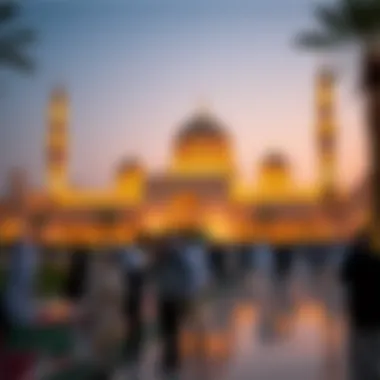

During Ramadan, the fast requires alterations to daily routines. Mornings start earlier with Suhoor, the pre-dawn meal, encouraging families to gather and set intentions for the day. Many workplaces adjust their hours, creating a more flexible environment that helps accommodate the needs of those observing the fast. This adjustment, where companies might delay start times or shorten working hours, has practical benefits; it allows employees to effectively manage their energy while fulfilling their professional commitments.
"In the heart of Dubai, the workweek can flow like the tides, ensuring that productivity sees balance with observance."
The bustling city, known for its fast pace, takes on a different life when the sun sets. The communal spirit shines particularly bright during Iftar, the evening meal breaking the fast. It’s common to see families and friends coming together, sharing meals not just within their households, but extending invitations to neighbors and colleagues. This custom strengthens bonds and cultivates an atmosphere of unity. Furthermore, community iftars organized in public spaces, particularly in mosques, bring together diverse groups. This social fabric of Ramadan fosters an inclusive environment that supports all cultures amidst the backdrop of a predominantly Islamic setting.
Culinary Experiences
Culinary experiences during Ramadan in Dubai are nothing short of exquisite. The city, with its melting pot of cultures, offers an array of flavors that elevate traditional meals and introduce exciting culinary twists. Restaurants prepare special iftar menus featuring everything from classic Emirati dishes like harees and tabeekh to fusion cuisines that cater to international palettes.
Street food stalls bustling with locals emerge as staple attractions. Vendors set up shop, offering dates and refreshing drinks to help break the fast. It's a heartwarming sight as individuals gather around, sharing smiles and laughter while savoring every bite. Visitors to Dubai during this month can indulge in unique dining experiences:
- Taste tasting sets that allow sampling various cuisines.
- Buffets offering myriad dishes, ensuring no one leaves hungry.
- Sweet shops filled with delicacies such as kunafa and maamoul.
Local markets bustle with activity as families stock up on ingredients to prepare traditional meals at home. Special seasonal items, like fresh herbs and spices, adorn stalls. Investing in the food scene during Ramadan can be highly lucrative, as restaurants and cafes often see increased foot traffic. For expatriates or newcomers, this month offers a chance to learn about local customs through food while forming connections over shared meals.
In essence, observing Ramadan in Dubai transforms the city not only in its routines but also in its culinary landscape. Whether you’re an investor, a real estate developer, or simply a curious observer, understanding these lifestyle shifts during this holy month can enhance your engagement with the city's vibrant community. This phase of spiritual importance certainly shapes the way people live and interact, making it an appealing opportunity for all.
Impact on the Real Estate Market
Ramadan presents a unique landscape for the real estate market in Dubai. With cultural traditions converging with economic cycles, the movement of properties often sees a distinct shift during this holy month. Investors need to be attuned to these patterns to navigate this tumultuous yet promising period. The social dynamics, consumer behavior, and overall sentiment during Ramadan can have substantial influence on property prices and transaction volumes, making it critical for those in the market to understand the nuances at play.
Market Trends During Ramadan
As Ramadan unfolds, certain trends come to the forefront in the real estate sector within Dubai. Historically, the demand for rental properties often surges. Many expatriates, as well as local families, look for short-term housing solutions that can accommodate larger gatherings typical of Ramadan celebrations. With families hosting iftar dinners bringing together relatives and friends, the need for spacious homes increases.
A few factors contributing to this trend include:
- Increased Rental Activity: Seasonal renters frequently seek out properties to host family gatherings. Short-term leases become an attractive option.
- Price Adjustments: Property owners may adjust rental prices to attract tenants during this period. This can create opportunities for savvy investors to secure favorable deals.
- Community Spirit: Neighbors come together during Ramadan, leading to a demand for homes in communities known for their festive spirit and cultural activities.
As such, the real estate market isn't just about numbers and figures but also about fostering connections and enhancing community ties.
Investment Opportunities
Ramadan opens a window to various investment opportunities, particularly for those looking to capitalize on seasonal dynamics. Investors with deep knowledge of market fluctuations can implement strategies that align with the specific needs of the community during this holy month.
Here are some notable opportunities:
- Commercial Properties: Establishing businesses catering to Ramadan needs—like restaurants or grocery stores that offer iftar specials—could prove rewarding. Locations near busy residential areas often see spikes in foot traffic during this time.
- Event Spaces: As community gatherings become a staple, event spaces that can accommodate large numbers become more sought after. This may be very lucrative for landlords who can adapt their properties accordingly.
- Focus on Family Living: Properties that allow for larger family living or accommodations for multiple generations tend to remain desirable. Investors can consider acquiring or renovating properties that enhance livability for families.
Investors must approach opportunities during Ramadan with sensitivity to the cultural context and community needs. Understanding the local sentiment can significantly enhance prospects for success in this unique market landscape.
The Role of Expatriates During Ramadan
In a cosmopolitan city like Dubai, expatriates play a pivotal role in shaping the atmosphere during Ramadan. As a melting pot of cultures, the involvement of expatriates not only enriches the cultural tapestry but also echoes the essence of compassion and community that defines this sacred month. Their contributions and participation go beyond mere observance; they enhance the overall experience for both the local population and other foreign residents.
Cultural Exchange and Sensitivity
During Ramadan, the essence of cultural exchange is palpable in Dubai. Expatriates from different backgrounds engage with the local traditions, often sharing their own customs as well. This exchange fosters mutual understanding and helps bridge cultural gaps. For example, many expatriates partake in iftar meals, where they can taste traditional dishes like harira or sambusas, alongside their home-cooked meals. This culinary convergence not only broadens palates but also spices up community relationships.
When embracing Ramadan, cultural sensitivity is essential. Expatriates are encouraged to respect fasting practices and understand the significance behind them. Simple awareness, like refraining from eating or drinking in public during the daytime, goes a long way. It's akin to wearing a cultural outfit for a special event; it shows respect for the host's traditions. Creating a space where everyone feels comfortable can foster a sense of belonging. Moreover, understanding the nuances of Islamic traditions allows expatriates to engage more deeply, such as during prayer times or community gatherings.
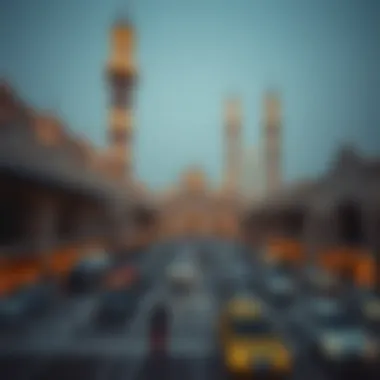

Community Involvement
Expatriates often take the initiative to contribute to communal activities throughout Ramadan. Local organizations frequently reach out to the expatriate community to encourage participation in various charitable events. This aspect becomes especially relevant, as generosity and giving are at the heart of Ramadan.
Expats can engage in volunteering at local shelters, helping organize iftar meals for the less fortunate, or even participating in food drives. This involvement not only benefits the recipients but also enriches the expatriates’ connection to the local community.
Here’s a small list of ways expatriates can get involved:
- Volunteering at local charities: Many organizations look for helping hands during Ramadan.
- Hosting cultural events: Share food, music, or stories that showcase diverse backgrounds while respecting Ramadan traditions.
- Participating in community iftars: Join locals for communal breaking of the fast, promoting unity and connection.
"It’s not just about being part of the festivities; it’s about creating meaningful relationships and fostering a spirit of togetherness. The bonds formed during Ramadan can transcend cultural lines."
As expatriates immerse themselves in the Ramadan spirit, they not only enhance their own experiences but also contribute to the larger community dynamic, creating a more vibrant and inclusive environment. The harmony established through shared traditions and mutual respect plays an essential role in the unique fabric of life in Dubai during this esteemed month.
Reflections on Ramadan
The period of Ramadan serves not just as a month of fasting but also as an opportunity for profound reflection and growth. This section delves into the importance of reflecting on the core principles and practices associated with this holy month. It captures the essence of personal and communal renewal that's deeply embedded in the observance of Ramadan.
Spiritual Significance
Ramadan is fundamentally a time of spiritual reawakening for Muslims across the globe, and this is particularly pronounced in a culturally rich city like Dubai. The essence of fasting during the daylight hours transcends mere abstinence from food and drink; it invites devotees to engage in deeper contemplation of their spirituality. The goal here is to foster a stronger connection with Allah and to reinforce moral values such as compassion, self-discipline, and humility. The nightly Taraweeh prayers, held in mosques throughout the city, serve as opportunities for communal worship and reflection.
Expatriates and locals alike join together, and that sense of community adds layers of meaning to the observance.
"Fasting is not just about restraining from food; it’s about nourishing the soul."
This quote encapsulates the spiritual journey taken during Ramadan. Many find themselves gravitating towards charitable acts, elevating their engagement in good deeds. This is a significant aspect not merely for personal benefit, but as a way to uplift those in less fortunate circumstances, making compassion a collective virtue of the month.
Personal Growth Opportunities
Ramadan also presents a unique landscape for personal growth that extends well beyond the confines of spiritual introspection. The act of fasting has proven benefits for mental clarity, emotional resilience, and physical health. In Dubai, this month provides rare moments for self-assessment. As individuals adjust their daily routines—scheduling work and social activities around fasting hours—they often find themselves honing crucial skills such as time management and prioritization.
The tranquility that comes with quiet reflection can lead to revelations about personal and professional life.
Here are some ways that Ramadan encourages personal development:
- Increased Mindfulness: A focus on gratitude and appreciation helps cultivate a mindset of positivity.
- Setting Goals: Many choose to reassess life goals, leading to a clearer vision of their future ambitions, be it in career paths, personal health, or relationships.
- Building Empathy: Experiencing hunger and thirst builds understanding and connection to those who face these challenges daily, enriching one’s capacity for empathy.
In summary, the multifaceted reflections during Ramadan in Dubai weave spirituality and personal growth into a rich tapestry of experiences. For investors, realtors, architects, and developers, understanding these layers can inform community engagement strategies and foster deeper connections with the city's diverse population.
Epilogue
As we draw the curtain on this exploration of Ramadan in Dubai for 2023, it's important to emphasize the various layers that make this month so significant. Ramadan is not just a time for fasting; it symbolizes a communal bond that resonates with both residents and visitors. The month teaches us virtues of reflection, empathy, and unity, creating a unique atmosphere throughout the city.
Ramadan's timing, specifically influenced by the moon sighting, adds an element of anticipation and excitement. For investors and expatriates, understanding this transition can offer valuable insights into the local culture and how it influences business and social dynamics. Businesses feel the ebb and flow of activity, with timings adjusted for prayer and meals, affecting everything from working hours to customer engagement.
Additionally, the cultural practices and community events during this period enrich the experience, presenting a wonderful opportunity for cultural exchange. Investors have to consider these elements to thrive, ensuring they respect traditions while engaging with the market.
In summary, while the practical aspects of investing during Ramadan cannot be discounted, appreciating the nuances of this holy month enhances one’s experience in Dubai. A well-rounded understanding leads to better connections, both socially and economically.
Summary of Key Points
- Significance of Ramadan: It’s a period of spiritual reflection, community bonding, and cultural engagement.
- Timing Matters: The start of Ramadan is determined by moon sighting, creating a unique rhythm in day-to-day life.
- Impact on Business: Investors should be aware of altered work hours and customer behaviour during this time.
- Cultural Sensitivity: Engaging in Ramadan goes beyond business, requiring a respectful comprehension of local customs.
Looking Ahead to Future Ramadans
The insights derived from observing Ramadan in 2023 can set a precedent for how future months are approached. As Dubai continues to grow, the significance of harmony between cultural observances and practical considerations will become even more pertinent.
Trends indicate that as more expatriates and new businesses arrive in the region, the cultural layer of Ramadan will evolve, potentially leading to more inclusive and diverse celebrations. With each Ramadan, there’s potential to strengthen community ties and foster deeper understanding among various cultures, making the city’s cosmopolitan fabric even richer.















